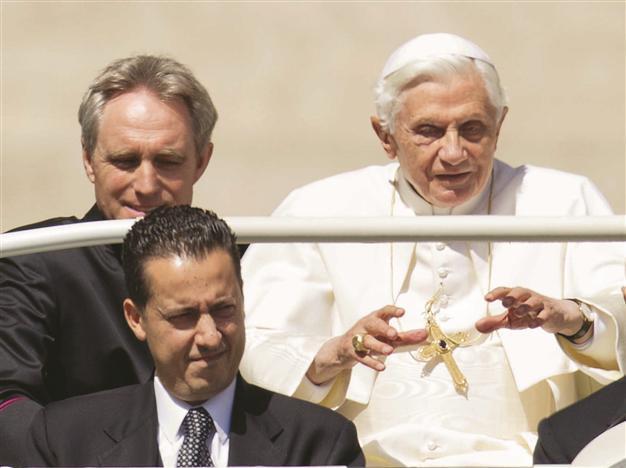Questions still linger in Vatileaks scandal
VATICAN CITY - Agence France-Presse

Pope Benedict XVI, flanked by his private secretary, Georg Gaenswein (back L),
and his butler, Paolo Gabriele arrives at St Peter’s square in this file photo. AP photo
Starting with the victim, Pope Benedict XVI, there was nothing normal about the trial of Paolo Gabriele, the Vatican butler convicted on Oct. 6 of stealing secret papers from the papal palace.
The defendant said he was inspired by the Holy Spirit to rid the Vatican of “evil and corruption” and the main judge was from an aristocratic family that has served the papacy for generations who has been knighted by the Vatican.
Gabriele was found guilty of aggravated theft and given 18 months in prison, although Vatican spokesman Federico Lombardi said that a pardon from Benedict was “very likely” to come soon, before the sentence was actually implemented.
The biggest trial in modern Vatican history leaves many questions hanging. One of the most pressing is whether Gabriele really did act alone as he claims; another is whether the Vatican will probe some of the most serious allegations of fraud contained in the papers Gabriele leaked to a journalist.
An investigation is ongoing and Vatican gendarmes are still analysing computer files seized from Gabriele’s home after finding “more than 1,000” sensitive documents including letters the pope had marked “To Be Destroyed”. The findings of a parallel inquiry into the “Vatileaks” scandal conducted by a committee of cardinals appointed by the pope have also not been made public. The cardinals interviewed dozens of people working in the Vatican.
Lombardi said only “a limited part” of the criminal inquiry was complete and that other more serious charges -- such as the violation of state secrecy, defamation and conspiracy -- were still being considered by investigators.
The trial gave a few hints of Gabriele’s social network and the jealousies and tensions under the surface in the Vatican’s tight-knit community. He himself claimed there was “widespread discontent” in the Vatican and said that senior cardinals and the pope’s former housekeeper had confided in him. In the only interview he gave before his arrest in May, he said there were “around 20” like-minded people spread across different Vatican departments.
Gabriele also told the police that he had confessed his crime to a priest, Father Giovanni Luzi, and handed him copies of the documents he was leaking. The priest said he burnt them since he knew they were illegally obtained.
In one interrogation, Gabriele said some papers he leaked with allegations of corruption in the Vatican police had been given to him by a third person. But investigators have so far identified only one other person who has been charged with aiding and abetting the butler.
Prosecutors said they first thought he must have acted with others because of all the secret papers found in a search of his home, many more than were ever published, but had since found “no evidence” of accomplices. Gabriele’s career is also an open question as the court did not accept a request from prosecutors for Gabriele to be banned from positions of responsibility in the Vatican and the butler is only suspended from his duties. Nuzzi has said the investigation should not be into how the documents were leaked but into the actual allegations contained in the documents. He said: “With the end of the trial, will the contents of the book be discussed or will there still be a commotion aimed at discrediting Gabriele?”
